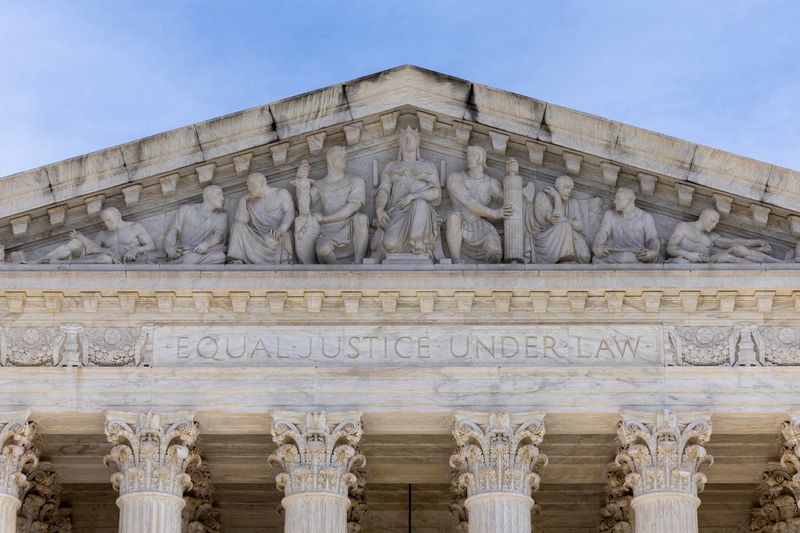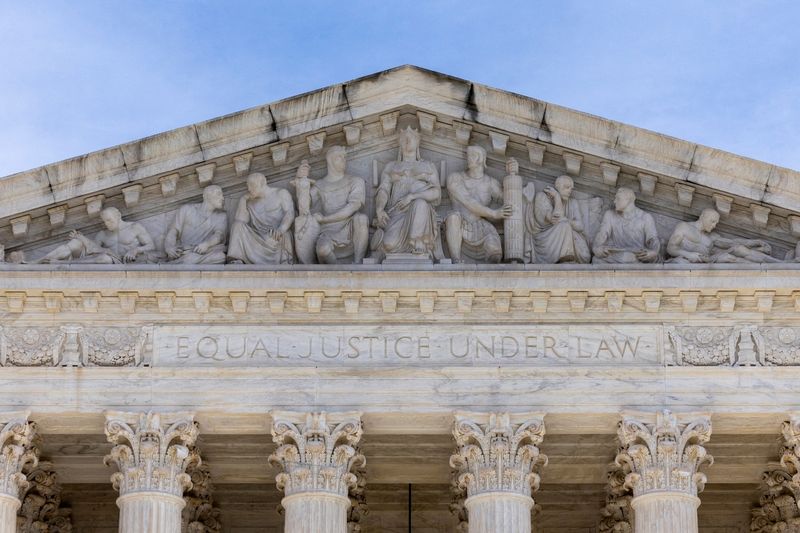Stock Markets
US Supreme Court weighs Florida, Texas laws regulating social media companies


© Reuters. FILE PHOTO: General view shows the United States Supreme Court, in Washington, U.S., February 8, 2024. REUTERS/Amanda Andrade-Rhoades
By John Kruzel and Andrew Chung
WASHINGTON (Reuters) -The U.S. Supreme Court on Monday appeared torn over whether to allow a Republican-backed Florida law to take effect despite concerns that it restricts the ability of social media platforms to curb content that these companies deem objectionable.
The justices completed arguments in the case before turning to arguments over the legality of a similar Republican-backed law in Texas. The Supreme Court previously blocked the Florida law while litigation played out at a lower court.
At issue in the cases is whether these 2021 state laws regulating content-moderation practices by large social media platforms violate the free speech protections for the companies under the U.S. Constitution’s First Amendment. Lower courts split on the issue, blocking key provisions of Florida’s law while upholding the Texas measure.
Conservative Chief Justice John Roberts asked Henry Whitaker, Florida’s solicitor general, about First Amendment concerns concerning “the state regulating what we have called the modern public square.”
Whitaker argued that First Amendment rights are not implicated because the Florida law regulates conduct, not speech or expression.
Conservative Justice Brett Kavanaugh pressed Whitaker on how to reconcile this argument with prior Supreme Court rulings that “emphasize editorial control as being fundamentally protected by the First Amendment.”
The Florida and Texas laws were challenged by tech industry trade groups NetChoice and the Computer & Communications Industry Association (CCIA), whose members include Facebook parent Meta Platforms (NASDAQ:), Alphabet (NASDAQ:)’s Google, which owns YouTube, as well as TikTok and Snapchat owner Snap.
Neither law has gone into effect due to the litigation.
The justices must decide whether the First Amendment protects the editorial discretion of the social media platforms and prohibits governments from forcing companies to publish content against their will. The companies have said that without such discretion – including the ability to block or remove content or users, prioritize certain posts over others, or include additional context – their websites would be overrun with spam, bullying, extremism and hate speech.
Another issue for the justices is whether the state laws unlawfully burden the free speech rights of social media companies by requiring them to provide users with individualized explanations for certain content-moderation decisions, including the removal of posts from their platforms.
The Supreme Court has a 6-3 conservative majority.
President Joe Biden’s administration, which opposes the Florida and Texas laws, has argued that the content-moderation restrictions violate the First Amendment by forcing platforms to present and promote content they view as objectionable.
Officials from Florida and Texas have countered that the content-moderation actions by these companies fall outside the protection of the First Amendment because such conduct – which they deem “censorship” – is not itself speech.
Conservative critics of “Big Tech” companies have cited as an example of what they called censorship the decision by the platform previously called Twitter to suspend then-President Donald Trump shortly after the Jan. 6, 2021, attack on the U.S. Capitol by his supporters, with the company citing “the risk of further incitement of violence.” Trump’s account has since been reinstated under Elon Musk, who now owns the company that was renamed X.
In signing the law in 2021, Florida Governor Ron DeSantis said, “Many in our state have experienced censorship and other tyrannical behavior firsthand in Cuba and Venezuela. If Big Tech censors enforce rules inconsistently, to discriminate in favor of the dominant Silicon Valley ideology, they will now be held accountable.”
Florida’s law requires large platforms to “host some speech that they might otherwise prefer not to host” by prohibiting the censorship or banning of a political candidate or “journalistic enterprise.”
Texas Governor Greg Abbott, in signing the law in 2021, said, “There is a dangerous movement by some social media companies to silence conservative ideas and values. This is wrong and we will not allow it in Texas.”
The Texas law forbids social media companies with at least 50 million monthly active users from acting to “censor” users based on “viewpoint,” and allows either users or the Texas attorney general to sue to enforce it.
Florida is seeking to revive its law after the Atlanta-based 11th U.S. Circuit Court of Appeals ruled largely against it. The industry groups are appealing a decision by the New Orleans-based 5th U.S. Circuit Court of Appeals upholding the Texas law, which the Supreme Court blocked at an earlier stage of the case, with liberal Justice Elena Kagan and three of the court’s more conservative justices in dissent.
Stock Markets
Suburban Propane director Logan sells $139k in shares
Stock Markets
Stock market today: S&P 500 closes lower, but posts big weekly win
Stock Markets
TD Bank promotes Laura Nitti to retail market president role

 Forex3 years ago
Forex3 years agoForex Today: the dollar is gaining strength amid gloomy sentiment at the start of the Fed’s week

 Forex3 years ago
Forex3 years agoUnbiased review of Pocket Option broker

 Forex3 years ago
Forex3 years agoDollar to pound sterling exchange rate today: Pound plummeted to its lowest since 1985

 Forex3 years ago
Forex3 years agoHow is the Australian dollar doing today?

 Cryptocurrency3 years ago
Cryptocurrency3 years agoWhat happened in the crypto market – current events today

 World3 years ago
World3 years agoWhy are modern video games an art form?

 Commodities3 years ago
Commodities3 years agoCopper continues to fall in price on expectations of lower demand in China

 Economy3 years ago
Economy3 years agoCrude oil tankers double in price due to EU anti-Russian sanctions





















